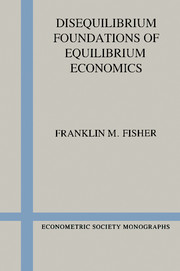Book contents
- Frontmatter
- 1 Introduction: Disequilibrium analysis and the theory of value
- Part I Methods and Problems of the General Equilibrium Stability Literature
- Part II A Model of Disequilibrium with Arbitraging Agents
- 4 Allowing disequilibrium awareness
- 5 The theory of the individual agent
- 6 Transaction difficulties, individual price offers, and monopoly power
- 7 Walras’ Law and the properties of equilibrium
- 8 Dynamics and stability
- 9 Concluding thoughts
- Appendix: Mathematics of stability
- References
- Index
6 - Transaction difficulties, individual price offers, and monopoly power
Published online by Cambridge University Press: 05 January 2013
- Frontmatter
- 1 Introduction: Disequilibrium analysis and the theory of value
- Part I Methods and Problems of the General Equilibrium Stability Literature
- Part II A Model of Disequilibrium with Arbitraging Agents
- 4 Allowing disequilibrium awareness
- 5 The theory of the individual agent
- 6 Transaction difficulties, individual price offers, and monopoly power
- 7 Walras’ Law and the properties of equilibrium
- 8 Dynamics and stability
- 9 Concluding thoughts
- Appendix: Mathematics of stability
- References
- Index
Summary
Introduction
The analysis of the previous chapter proceeded as though agents always expect to be able to complete their planned transactions with no difficulty. This is hardly a reasonable assumption in a disequilibrium model where agents constantly find their plans thwarted. Further, given the absence of any subjective uncertainty, the fact that transactions of all sizes are assumed to be costlessly made leads the otherwise very sensible speculation results of the previous chapter to be of the “bang-bang” sort: agents rush discontinuously from one arbitrage opportunity to another, switching from buying to selling large amounts in pursuit of even very small speculative profits. It is plainly time to deal with such matters.
In fact, there is more than one matter to deal with here; there are three, and they are related in somewhat different ways.
The first issue is the analysis of transaction costs, that is, difficulties in transacting that prevent the “bang-bang” property just described from arising. Such costs may be thought of either as effort which must be expended in the search for trading partners or as a partial substitute for the effects of subjective uncertainty, which is otherwise conspicuously absent from the model. As we shall see, incorporating this kind of transaction difficulty into the analysis is easy to do; it has some interesting consequences, but it raises no very deep problems.
- Type
- Chapter
- Information
- Disequilibrium Foundations of Equilibrium Economics , pp. 138 - 157Publisher: Cambridge University PressPrint publication year: 1983



